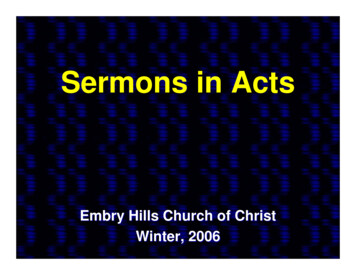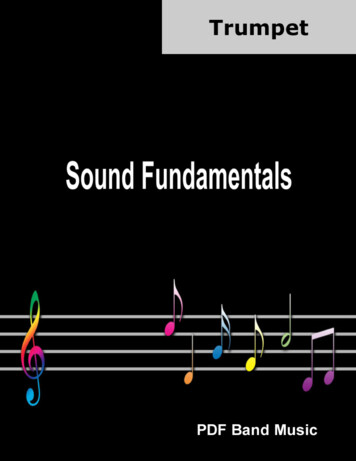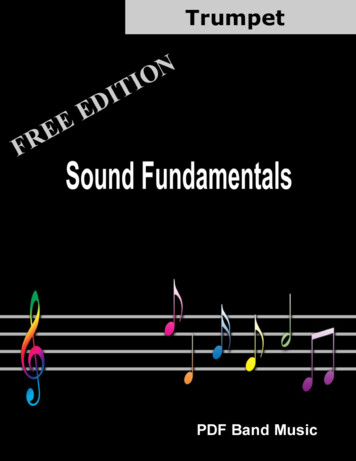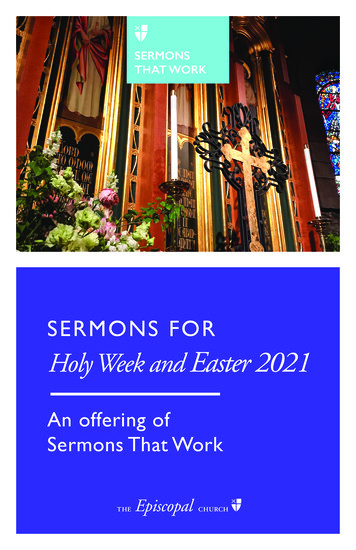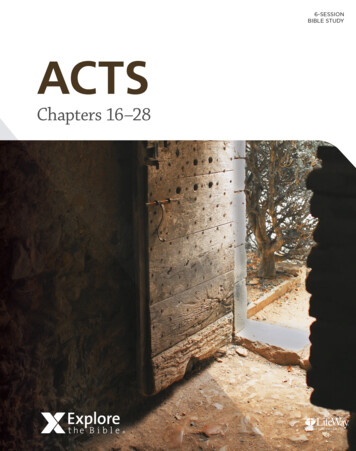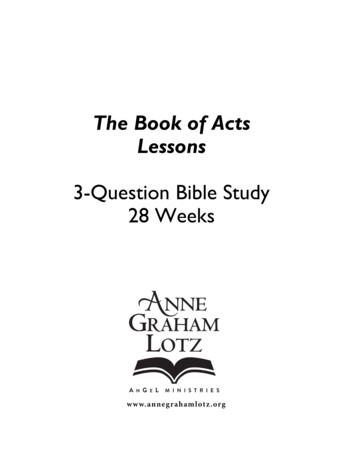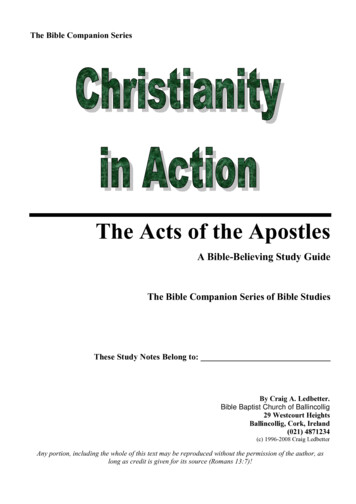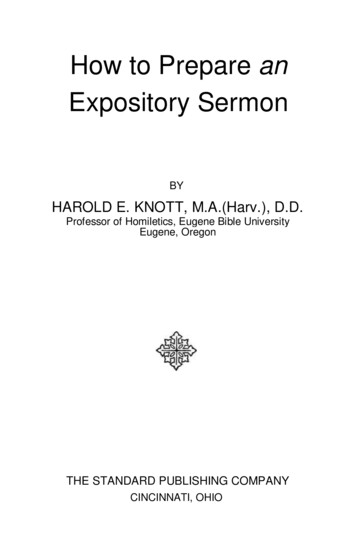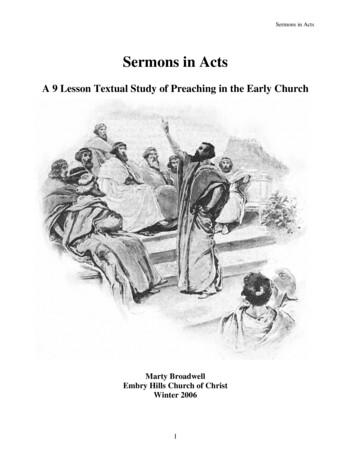
Transcription
Sermons in ActsSermons in ActsA 9 Lesson Textual Study of Preaching in the Early ChurchMarty BroadwellEmbry Hills Church of ChristWinter 20061
Sermons in ActsSermons in ActsLesson List#Lesson TitleTextPeriods1Introduction12Peter on Pentecost2:14-4023Peter at Solomon’s Porch3:11-2614Stephen’s Defense7:1-5325Peter at Cornelius’ house10:34-4316Paul at Antioch of Pisidia13:16-4217Paul at Lystra & Athens14:14-17; 17:22-3128Paul at Miletus20:17-3519Paul before Agrippa & Festus26:1-23110Review12
Sermons in ActsLesson 1 – IntroductionA. Course Purpose: Learn and imitate the teaching of the early Christian preachers, byevaluating the background and needs of the audience, and studying the structure and content ofthe inspired preachers.B. Overview of the book of Acts.1. Name the author and recipient of the book of Acts. (1:1 and see Luke 1:1-3)2. What is the outline of the book implied in 1:8? 3. How were those who were told to be Jesus’ witnesses to be empowered? (1:8)4. Fill in the major outline sections from the class discussion:I. 1:1-1:11 –II. 1:12-8:3 –III. 8:4-11:18 –IV. 11:19-21:16 –V. 21:17-28:31 –5. What key events marked the opening of each section? 1:11 – 2:2 – 8:1 – 11:18 –6. What time span is covered by the book of Acts?C. Studying the sermons in Acts1. What reasons can you think of for studying the sermons in the book of Acts? Consider: I Cor 1:18-21 John 17:17-20 Heb 2:1-42. What differences would you expect there to be in sermons preached to: Jews in Jerusalem Christians still learning someaspects of Truth Jews in other parts of the world Elders of a church Religious (Proselyte) Gentiles Pagan Gentiles3. For each sermon we will try to determine: The time and place The speaker The audience The knowledge & religious background of the audience The issue or circumstances of the sermon The major points made (and how they relate to the circumstances)3
Sermons in ActsD. Jesus Parting Commands.1. What had Jesus been teaching the disciples between the resurrection and ascension? (seeLuke 24:25-27; 24:44-46; Acts 1:3)2. Fill out the chart below, based on the instructions given in the three accounts of the GreatCommission.E. Themes in the Sermons. We will look for these (and other) themes in the Sermons. Use theworksheet on page 5 to note the mention of the key themes in each sermon. Miracles & Signs of Jesus – With Witnesses Resurrection of Jesus – With Witnesses Prophecies of the Christ (Messiah) Fulfilled in Jesuso Suffering Messiaho Resurrectiono Coronation (Throne of David) Christ’s Current Reign in Heaven Coming Judgment God’s Control in Events Human Guilt Before God Forgiveness by Response to the Gospelo Requirement to Repento Baptism Exclusivity of Truth Universality of the Gospel Rejection by the Jews4
Sermons in Acts5
Sermons in ActsLesson 2 – Peter on Pentecost (Acts 2:14-40)Acts 2:14-4014A. Objectives (the student will be able to): Describe the occasion that led to the sermon. List what the Jewish audience knew andunderstood before the sermon began List the three arguments Peter makes to provethat Jesus is the Messiah Give the Old Testament reference for the threeprophecies that Peter uses. List four of the themes found in the sermon.B. Background.1. What was the time and place of this Sermon(Acts 1:1-5; 2:1)?Was this time & place planned? (see 1:7)Why was this time and place important to theevidence given and the spread of the gospel?2. Who was the speaker? (see Acts 1:26; 2:14)What special qualifications and empowermentdid they have? (1:8; 2:4)Was this consistent with the plan & promises ofJesus? (John 14:26; 16:12-14)3. Describe the composition of the audience.Were they religious?Did they believe the (Old Testament) scripture?Were they already aware of Jesus and his works?Did they already believe in the resurrection ofJesus?His kingship?4. What brought the group together?What immediate questions did they have (2:12)What preliminary conclusions were theydrawing?C. Outline of the Sermon. Write a brief title for eachsection of the sermon. 14-21 22-24 25-36 38-40D. Analysis of the SermonVerses 14-21.1. How does Peter address the audience?2. What argument does he make that the twelveApostles were not drunken?3. How does he explain the sound, fire, and tongues(see 2:3,4)?6But Peter, standing up with the eleven, raised his voiceand said to them, “Men of Judea and all who dwell inJerusalem, let this be known to you, and heed my words.15For these are not drunk, as you suppose, since it is onlythe third hour of the day. 16But this is what was spokenby the prophet Joel:17‘And it shall come to pass in the last days, says God,That I will pour out of My Spirit on all flesh;Your sons and your daughters shall prophesy,Your young men shall see visions,Your old men shall dream dreams.18And on My manservants and on my maidservantsI will pour out My Spirit in those days;And they shall prophesy.19I will show wonders in heaven aboveAnd signs in the earth beneath:Blood and fire and vapor of smoke.20The sun shall be turned into darkness,And the moon into blood, Before the coming of thegreat and notable day of the Lord.21And it shall come to pass that whoever calls on thename of the Lord shall be saved.’22"Men of Israel, hear these words: Jesus of Nazareth, aMan attested by God to you by miracles, wonders, andsigns which God did through Him in your midst, as youyourselves also know—23 Him, being delivered by thedetermined counsel and foreknowledge of God, you havetaken by lawless hands, have crucified, and put to death;24whom God raised up, having loosed the pains of death,because it was not possible that He should be held by it.25"For David says concerning Him:'I foresaw the Lord always before my face,For He is at my right hand, that I may not be shaken;26Therefore my heart rejoiced, and my tongue was glad;Moreover my flesh will also rest in hope,27Because You will not leave my soul in Hades,Nor will You allow Your Holy One to see corruption.28You have made known to me the ways of life;You will make me full of joy in Your presence.'29"Men and brethren, let me speak freely to you of thepatriarch David, that he is both dead and buried, and histomb is with us to this day. 30Therefore, being a prophetand knowing that God had sworn with an oath to himthat of the fruit of his body, according to the flesh, Hewould raise up the Christ to sit on his throne, 31he,foreseeing this, spoke concerning the resurrection of theChrist, that His soul was not left in Hades, nor did Hisflesh see corruption. 32This Jesus God has raised up, ofwhich we are all witnesses. 33Therefore being exalted tothe right hand of God, and having received from theFather the promise of the Holy Spirit, He poured out thiswhich you now see and hear. 34For David did not ascendinto the heavens, but he says himself: ‘The Lord said tomy Lord, “Sit at My right hand, 35 Till I make Yourenemies Your footstool.”’ 36Therefore let all the house ofIsrael know assuredly that God has made this Jesus,whom you crucified, both Lord and Christ.”37Now when they heard this, they were cut to the heart,and said to Peter and the rest of the apostles, “Men andbrethren, what shall we do?” 38 Then Peter said to them,“Repent, and let every one of you be baptized in thename of Jesus Christ for the remission of sins; and youshall receive the gift of the Holy Spirit. 39For the promiseis to you and to your children, and to all who are afar off,as many as the Lord our God will call.” 40And with manyother words he testified and exhorted them, saying, "Besaved from this perverse generation."
Sermons in Acts4.5.6.7.Where is the prophecy quoted in verses 7-21) found in the Old Testament?What is the context of Joel’s prophecy of outpouring of the Spirit (see Joel chaps 1 &2)?What are some saved from (Acts 2:19,20)?Who calls whom in this rescue (v 21, and see Joel 2:32b; compare to Acts 2:39)?Verses 22-241. By what description is Jesus introduced?Did the audience know Him?2. What connection is there between the preceding explanation of the pouring out of the Spiritand Jesus (see vs 33)?3. Were they aware of Jesus’ “mighty works”, etc.?4. Were they aware of how He died?5. Who did Peter say was responsible for His death? (Complete List.)6. What news does verse 24 introduce?Verses 25-361. To what “prophet” (see v 30) does Peter now turn?Where is the quote in v. 25-28 taken from?2. Describe the context of this passage (read the entire Psalm).3. What problem is created by the presence of David’s tomb in Jerusalem?4. What reference does Peter probably have in mind in the statement in vs 30?5. Who must David have been speaking of who “would not see corruption” (v 31)?6. How were those present to believe in Jesus’ resurrection (v 32)?7. Compare 2:32 with Jesus’ instructions in Luke 24:48.8. What other event, after the resurrection, does Peter reveal (v 33)?What two pieces of evidence does He give for this coronation?9. What is the context of the Old Testament quote in vs 34? (read the entire Psalm)10. Who else mentioned this passage in discussions with the Jews? (see Matt 23:44)11. Does this new status of Jesus give added weight to the charge that they had crucified Him?Verses 38-401. What question (vs37) is Peter answering in v 38?What problem were they seeking to find an solution for?2. Did these people believed in the deity and resurrection of Jesus at this point?3. What were they told to do, and what was the result going to be?4. What further exhortation did Peter give (v 40)?E. Conclusions and Applications1. Think about how Peter’s sermon move from the immediate event (the speaking in tongues)to the gospel?How can our teaching of others imitate this approach?2. Which of the themes do you see in this sermon? List the references where you find them: God’s Control in Events Human Guilt Before God Forgiveness by Response to the Gospel Requirement to Repent Baptism Exclusivity of Truth Universality of the GospelMiracles of Jesus – With WitnessesResurrection – With WitnessesProphecies of the Christ Suffering Messiah Resurrection CoronationChrist’s Current Reign in HeavenComing Judgment7
Sermons in ActsLesson 3 – Peter at Solomon’s Porch (Acts 3:11- 4:12)A. Objectives (the student will be able to): Describe the occasion that led to the sermon. List the two Old Testament references Peter uses toprove that Jesus is the Christ. List four similarities and 2 differences between thissermon and the one on Pentecost. List three ways Jesus is like Moses. List four of the themes found in this sermon.Acts 3:11-2611Now as the lame man who was healed held onto Peter and John, all the people ran together tothem in the porch which is called Solomon's,greatly amazed. 12 So when Peter saw it, heresponded to the people: “Men of Israel, why doyou marvel at this? Or why look so intently at us,as though by our own power or godliness we hadmade this man walk?13B. Background.1. What was the time of day & occasion (Acts 3:1, 2)?Who was present?2. Had other miracles been performed by the Apostlesbefore this one? (see 2:43)3. What did Peter “have none” of (3:6)?Reconcile this statement with Acts 2:45 & 3:34, 35.4. What & who attracted the crowd? (3:8-11)?5. Describe the background of the people that gatheredfor this sermon?C. Outline of the Sermon. Write a brief title for eachsection of the sermon. 3:12-16 3:17-21 3:22-24 3:25-26D. Analysis of the SermonVerses 3:11-12.1. How does Peter address the audience? (& see 2:22)2. What wrong conclusion does he deny (v 12)?How is this beginning similar to Pentecost?Verses 3:13-16.1. In what verse does Peter finally explain by whatpower the man had been healed?Why does hetake so long to get to the answer?2. How is God described?What has He done?Is he pictured as having acted decisively?How is Jesus described in v 13-15?3. List three things that Peter accuses the Jews of.4. Whose faith had “made the man strong”?Was it the man’s?The crowd’s?5. What was the significance of the healing power offaith in Jesus for these (guilty) Jews?8The God of Abraham, Isaac, and Jacob, the Godof our fathers, glorified His Servant Jesus, whomyou delivered up and denied in the presence ofPilate, when he was determined to let Him go.14But you denied the Holy One and the Just, andasked for a murderer to be granted to you, 15andkilled the Prince of life, whom God raised fromthe dead, of which we are witnesses. 16 And Hisname, through faith in His name, has made thisman strong, whom you see and know. Yes, thefaith which comes through Him has given him thisperfect soundness in the presence of you all.17Yet now, brethren, I know that you did it inignorance, as did also your rulers. 18 But thosethings which God foretold by the mouth of all Hisprophets, that the Christ would suffer, He has thusfulfilled. 19 Repent therefore and be converted,that your sins may be blotted out, so that times ofrefreshing may come from the presence of theLord, 20and that He may send Jesus Christ, whowas preached to you before, 21 whom heaven mustreceive until the times of restoration of all things,which God has spoken by the mouth of all Hisholy prophets since the world began. 22 For Mosestruly said to the fathers, 'The Lord you God willraise up for you a Prophet like me from yourbrethren. Him you shall hear in all things,whatever He says to you. 23‘And it shall come topass that every soul who will not hear that prophetshall be utterly destroyed from among the people.’24Yes, and all the prophets, from Samuel andthose who followed, as many as have spoken,have also foretold these days.25You are sons of the prophets, and of thecovenant which God made with our fathers,saying to Abraham, ‘And in your seed all thefamilies of the earth shall be blessed.’ 26 To youfirst, God, having raised up His Servant Jesus,sent Him to bless you, in turning away every oneof you from your iniquities.”Acts 4:8-128Then Peter, filled with the Holy Spirit, said tothem, "Rulers of the people and elders of Israel:9If we this day are judged for a good deed done tothe helpless man, by what means he has beenmade well, 10 let it be know to you all, and to allthe people of Israel, that by the name of JesusChrist of Nazareth, whom you crucified, whomGod raised from the dead, by Him this man standshere before you whole. 11This is the 'stone whichwas rejected by you builders, which has becomethe chief cornerstone.' 12 Nor is there salvation inany other, for there is no other name under heavengiven among men by which we must be saved."
Sermons in ActsVerses 3:17-21.1. Peter says they were ignorant of what they were doing. Who else said that (Lk 23:34)?Did their ignorance excuse them (see vs 19)2. Who was actually in control of events at the crucifixion (v 18)?3. What does Peter assert was prophesied about the Christ (v 18)?4. What title does that lead Peter to apply to Jesus (v 20, & see 2:37,38)?5. What does Peter call on the Jews to do, so that their sins could be “blotted out”?What blessing would follow?6. Where does he imply that Jesus (the Christ) is now?How long will He be there?7. What is the “restoration of all things”?8. How many of the prophets had spoken (for God) of Jesus (v 21, & see 24)?Verses 3:22-24.1. What is the Old Testament reference for the prophecy of Moses?2. In what ways is Jesus like Moses?3. What reference from Samuel might be referred to in verse 24?Verses 3:25-26.1. How are these Jews connected with (all these) prophets?2. What is the Old Testament reference quoted in verse 25?What meaning is now attached to the “seed” that would bless “all families”?3. What is foreshadowed in the reference to “all families” and “to you first” (v 25,26)?4. What requirement for “blessing” is given in verse 26?Verses 4:8-12.1. How is this audience different from the one on the previous day?2. How is this audience addressed? (see also vs. 11)3. What question is Peter answering (see v 7)?Is that really any different than the topic of the previous day?4. By what power does Peter answer (v 8)?5. Note how many points Peter packs into this three sentence answer. Find these: Fulfillment of Prophecy Their Guilt Current Reign of Jesus Messiah-ship of Jesus Salvation through Jesus Signs, with witnesses (see v 16) Resurrection Exclusivity of Truth God’s control of events6. Where in the Old Testament is the prophecy in v 11 found?Read this Psalm, and consider the context.7. Note the similar points made by Peter a short time later in 5:30-32.E. Conclusions.1. What did the priests, captain, and Sadducees think the sermon was about (see 4:2)?2. Find at least two examples of the theme of healing in this sermon.3. List the similarities between this sermon and the one on Pentecost.4. List at least two differences between the two sermons.9
Sermons in ActsLesson 4 – Stephen’s Defense (Acts 7:2-56)A. Objectives (the student will be able to): Describe the occasion that led to the sermon. List the 2 charges made against Stephen. List the Old Testament leaders that Stephen mentions List the underlying theme of the sermon. List 4 of the common themes found in this sermon.B. Background (Acts 6:8-15).1. What triggered the opposition of the Jews (6:8)?2. Who rose up to dispute with Stephen (6:9)?Who was probably included in this group (see 22:3)?3. How successful was this opposition?To what tactics did they resort (6:11-13)?4. List the charges made against Stephen (6:11-15). 5. Are these familiar charges (v 14, Mt. 26:61; 27:40)?What may have been the origin (see Jn. 2:19)?6. Describe Stephen’s character & abilities (6:3-5, 8).How did he appear to council members (6:15)?C. Outline of the Sermon. Write a title for each section. 7:2-87:9-167:17-367:37-437:44-507:51-53Acts 7:2-29And he said, "Men and brethren and fathers, listen:The God of glory appeared to our father Abrahamwhen he was in Mesopotamia, before he dwelt inHaran, 3 and said to him, 'Get out of your country andfrom your relatives, and come to a land that I willshow you.‘ 4 Then he came out of the land of theChaldeans and dwelt in Haran. And from there, whenhis father was dead, He moved him to this land inwhich you now dwell. 5 And God gave him noinheritance in it, not even enough to set his foot on.But even when Abraham had no child, He promisedto give it to him for a possession, and to hisdescendants after him. 6 But God spoke in this way:that his descendants would sojourn in a foreign land,and that they would bring them into bondage andoppress them four hundred years. 7 'And the nation towhom they will be in bondage I will judge,' said God,'and after that they shall come out and serve Me inthis place.' 8 Then He gave him the covenant ofcircumcision; and so Abraham begot Isaac andcircumcised him on the eighth day; and Isaac begotJacob, and Jacob begot the twelve patriarchs.9 And the patriarchs, becoming envious, sold Josephinto Egypt. But God was with him 10 and deliveredhim out of all his troubles, and gave him favor andwisdom in the presence of Pharaoh, king of Egypt;and he made him governor over Egypt and all hishouse. 11 Now a famine and great trouble came overall the land of Egypt and Canaan, and our fathersfound no sustenance. 12 But when Jacob heard thatthere was grain in Egypt, he sent out our fathers first.13And the second time Joseph was made known to hisbrothers, and Joseph's family became known to thePharaoh. 14 Then Joseph sent and called his fatherJacob and all his relatives to him, seventy-fivepeople. 15 So Jacob went down to Egypt; and he died,he and our fathers, 16 And they were carried back toShechem and laid in the tomb that Abraham boughtfor a sum of money from the sons of Hamor, thefather of Shechem.17 ButD. Analysis of the SermonVerses 2-8.1. How does Stephen address his audience?2. How does he refer to God?3. What do the events listed in vs 2-8 explain?How do they related to either of the charges made?4. Was the land inheritance promised to Abraham or hisdescendants (v 6)? How was this to happen (v 7)?5. Who clearly controlled these events (in every verse)?Verses 9-16.1. These verses describe what migration?2. What is the relevance of Joseph’s rejection by hisbrothers to the current controversy (see v 52a)?Who delivered Joseph from this rejection (v 9, 10)?3. To what position was Joseph exalted by God (v 10)?Did he become their savior & leader?10when the time of the promise drew near whichGod had sworn to Abraham, the people grew andmultiplied in Egypt 18 till another king arose who didnot know Joseph. 19 This man dealt treacherouslywith our people, and oppressed our forefathers,making them expose their babies, so that they mightnot live. 20At this time Moses was born, and was wellpleasing to God; and he was brought up in his father'shouse for three months. 21But when he was set out,Pharaoh's daughter took him away and brought himup as her own son. 22And Moses was learned in allthe wisdom of the Egyptians, and was mighty inwords and deeds. 23 But when he was forty years old,it came into his heart to visit his brethren, thechildren of Israel. 24 And seeing one of them sufferwrong, he defended and avenged him who wasoppressed, 25 For he supposed that his brethren wouldhave understood that God would deliver them by hishand, but they did not understand. 26 And the next dayhe appeared to two of them as they were fighting, andtried to reconcile them, saying, 'Men, you arebrethren; why do you wrong one another?‘ 27 But hewho did his neighbor wrong pushed him away,saying, 'Who made you a ruler and a judge over us?28 Do you want to kill me as you did the Egyptianyesterday?‘ 29 Then, at this saying, Moses fled andbecame a sojourner in the land of Midian, where hehad two sons.
Sermons in ActsVerses 17-36.1. Whose life story is told in this section?How isthis history relevant to the charges against Stephen?2. Describe the suffering of the Israelites in Egypt.3. How is Moses’ character described (v 20, 22)?4. How did he intend to use his power (v 23, 25)?What reception did he expect (v 25)?5. When he tried to save an Israelite, what was theman’s reaction?Where did Moses then go?6. Who prompted his return to Egypt (v 34)?7. What is the relevance of the story of Moses as therejected, but successful leader of Israel (see v 37)?Verses 37-43.1. What historical event is described in this section?How is this relevant to the charges against Stephen?2. What is the relevance of Moses’ prophecy in v 37?What other sermon included this prophecy (3:22)?3. Did Israel obey the Law Moses delivered (v 39, 53)?4. What prophet describes their sin & consequence?What is this prophet’s message (e.g. Amos 2:4,5)?5. What consequences in Israel’s history resulted fromtheir idolatry (v 43)?Who caused this to happen?6. What is the real & only reason that the Jew’s “place”had been (& would be) taken away (v 42,43)?Verses 44-50.1. What last item does Stephen discuss in this section?How is this history relevant to the charges?2. Were either the tabernacle or Solomon’s temple stillin existence?Who had built the current temple?3. Read the prophecy quoted here (Is 66:1-4) in itscontext. What two kinds of hearts are contrasted?What kind of spirit does God look on (Is 66:2).4. Why was reverencing the temple misguided?Who really “disrespected” God (Is 66:3, 4)?Verses 51-53 (56, 59, 60).1. As a conclusion, Stephen suggests that the Jews arejust like their fathers—in what way (v 51, 52)?2. How does he connect that behavior to Jesus (v 53)?What title (and connection) does he give to Jesus?3. In murdering Jesus, how were the Jews guilty of thevery thing of which Stephen was accused (v 53)?4. What additional implication about Jesus (the “Son ofMan” – see Dan 7:13,14) is found in v 56 and 59?E. Conclusions: Which themes do you see in this sermon?Are there new themes that should be added to our list?11Acts 7:30-56“And when forty years had passed, an Angel of the Lordappeared to him in a flame of fire in a bush, in thewilderness of Mount Sinai. 31When Moses saw it, hemarveled at the sight; and as he drew near to observe, thevoice of the Lord came to him, 32 saying, 'I am the God ofyour fathers -- the God of Abraham, the God of Isaac, andthe God of Jacob.' And Moses trembled and dared not look.33Then the Lord said to him, "Take your sandals off yourfeet, for the place where you stand is holy ground. 34 I havecertainly seen the oppression of my people who are inEgypt; I have heard their groaning and I have come down todeliver them. And now come, i will send you to Egypt."'35This Moses whom they rejected, saying, 'Who made you aruler and a judge?' is the one God sent to be a ruler and adeliverer by the hand of the Angel who appeared to him inthe bush. 36 He brought them out, after he had shownwonders and signs in the land of Egypt, and in the Red Sea,and in the wilderness forty years.37Thisis that Moses who said to the children of Israel, 'TheLord your God will raise up for you a Prophet like me fromyour brethren. Him you shall hear.' 38This is he who was inthe congregation in the wilderness with the Angel whospoke to him on Mount Sinai, and with our fathers, the onewho received the living oracles to give to us, 39whom ourfathers would not obey, but rejected. And in their hearts theyturned back to Egypt, 40saying to Aaron, 'Make us gods togo before us; as for this Moses who brought us out of theland of Egypt, we do not know what has become of him.'41And they made a calf in those days, offered sacrifices tothe idol, and rejoiced in the works of their own hands.42Then God turned and gave them up to worship the host ofheaven, as it is written in the book of the Prophets:‘Did you offer Me slaughtered animals and sacrificesduring forty years in the wilderness,O house of Israel?43Yes, you took up the tabernacle of Moloch,And the star of your god Remphan,Images which you made to worship;And I will carry you away beyond Babylon.’44Our fathers had the tabernacle of witness in the wilderness,as he appointed, instructing Moses to make it according tothe pattern that he had seen, 45which our fathers, havingreceived it in turn, also brought with Joshua into the landpossessed by the Gentiles, whom God drove out before theface of our fathers until the days of David, 46who foundfavor before God and asked to find a dwelling for the God ofJacob. 47But Solomon built Him a house. 48However, theMost High does not dwell in temples made with hands, asthe prophet says:49 'Heaven is My throne, And earth is My footstool.What house will you build for Me? says the Lord,Or what is the place of My rest?50 Has My hand not made all these things?’51 You stiff-necked and uncircumcised in heart and ears! Youalways resist the Holy Spirit; as your fathers did, so do you.52Which of the prophets did your fathers not persecute? Andthey killed those who foretold the coming of the Just One, ofwhom you now have become the betrayers and murders,53who have received the law by the direction of angels andhave not kept it.”54When they heard these things they were cut to the heart,and they gnashed at him with their teeth. 55But he, being fullof the Holy Spirit, gazed into heaven and saw the glory ofGod, and Jesus standing at the right hand of God, 56and said,"Look! I see the heavens opened and the Son of Manstanding at the right hand of God!” 59And they stoned Stephen as he was calling on God andsaying, “Lord Jesus, receive my spirit.” 60 Then he kneltdown and cried out with a loud voice, “Lord, do not chargethem with this sin." And when he had said this, he fellasleep.
Sermons in ActsLesson 5 – Peter at Cornelius’ House (Acts 10:34-48)A. Objectives (the student will be able to): Describe the circumstances and preparation God madeto bring Peter to Cornelius’ house. Explain the significance of the Holy Spirit falling onCornelius and his household. List at least four of our themes found in the sermon.B. Background (Acts 10:1-33).1. What kind of a man was Cornelius (v 1, 2)?Was he saved? (see v 43, and 11:14)2. What led Cornelius to send for Peter (v 3-8).What did the angel tell him was the purpose of thewords that Peter would speak (see 11:14)?3. What did Cornelius know about Jesus? (see v 37-38)4. Describe the events that led Peter to be receptive to thethree men sent by Cornelius (v 9-20).How did Peter interpret the vision (see 11:12)?Why was this preparation necessary (see v 28)?5. What was Cornelius’ reaction upon seeing Peter?Why do you think he reacted this way?6. As the two men exchanged stories in v 27-33, what wasclear about the meeting (who was controlling things?)7. What preparation had Cornelius made for the meeting?C. Outline of the Sermon. Write a title for each section. 10:34,35 10:36-38 10:39-41 10:42,43 10:47D. Analysis of the SermonVerses 34, 35.1. What “perception” had Peter (apparently recently)gained?Does this match Jesus’ command (Matt 28:19)?2. Is Peter stating the conditions of salvation in v 35?Explain.Acts 10:34-4834Then Peter opened his mouth and said:"In truth I perceive that God shows nopartiality. 35But in every nation whoeverfears Him and works righteousness isaccepted by Him. 36 The word which Godsent to the children of Israel, preachingpeace through Jesus Christ—He is Lordof all—37that word you know, which wasproclaimed throughout all Judea, andbegan from Galilee after the baptismwhich John preached: 38how Godanointed Jesus of Nazareth with the HolySpirit and with power, who went aboutdoing good and healing all who wereoppressed by the devil, for God was withHim. 39And we are witnesses of all thingswhich He did both in the land of the Jewsand in Jerusalem, whom they killed byhanging on a tree. 40 Him God raised upon the third day, and showed Him openly,41 not to all the people, but to witnesseschosen before by God, even to us who ateand drank with Him after He arose fromthe dead. 42And He commanded us topreach to the people, and to testify that itis He who was ordained by God to beJudge of the living and the dead. 43ToHim all the prophets witness that, throughH
Sermons in Acts 1 Sermons in Acts A 9 Lesson Textual Study of Preaching in the Early Church Marty Broadwell Embry Hills Church of Christ Winter 2006. . C. Outline of the Sermon. Write a brief title for each section of the sermon. 14-21 22-24 25-36 38-40 D. Analysis of the Sermon Verses 14-21.
